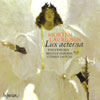Lauridsen Lux aeterna
Exemplary singing throughout – but does the material deserve it?
View record and artist detailsRecord and Artist Details
Composer or Director: Morten Lauridsen
Genre:
Vocal
Label: Hyperion
Magazine Review Date: 4/2005
Media Format: CD or Download
Media Runtime: 67
Mastering:
Stereo
DDD
Catalogue Number: CDA67449

Tracks:
| Composition | Artist Credit |
|---|---|
| O Magnum Mysterium |
Morten Lauridsen, Composer
Morten Lauridsen, Composer Polyphony Stephen Layton, Conductor |
| Lux aeterna |
Morten Lauridsen, Composer
Britten Sinfonia Morten Lauridsen, Composer Polyphony Stephen Layton, Conductor |
| Ubi caritas et amor |
Morten Lauridsen, Composer
Morten Lauridsen, Composer Polyphony Stephen Layton, Conductor |
| Madrigali |
Morten Lauridsen, Composer
Morten Lauridsen, Composer Polyphony Stephen Layton, Conductor |
| Ave Maria |
Morten Lauridsen, Composer
Morten Lauridsen, Composer Polyphony Stephen Layton, Conductor |
Author: Marc Rochester
There is some outstanding choral singing here, particularly in the six Madrigali. These are vocally challenging works demanding the kind of technical and musical supremacy in which Polyphony, now approaching their 20th year, are absolute masters. Under Stephen Layton’s sensitive and intelligent direction, they produce performances which are both fresh and immaculately detailed. I’m not sure that I recognise the ‘evanescent hope and erotic obsession’ that Byron Adams’s effusive booklet notes promise, but from the very declamatory opening of the first of the Madrigali – ‘Ov’è, lass’, il bel viso?’ – it is clear that Lauridsen’s score is, if nothing else, a virtuoso exploration of choral singing technique. As such he could not hope for a more assured or polished performance; or, for that matter, a more luscious recorded sound as Hyperion have produced in London’s Temple church.
While the music-making is no less impressive in the disc’s principal work, the five-section Lux aeterna for chorus and orchestra composed between 1995 and 1997, the music itself seems far less arresting or stimulating. Lauridsen has created, appropriately enough, a work which is bathed in the kind of soft, warm, slightly glutinous light that calls to mind the lava lamps of the 1970s, but that very luminosity quickly becomes an end in itself, and, only very occasionally (such as the impressive climax of the opening ‘Requiem aeternam’ or the wonderfully nimble setting of ‘Veni, Sancte Spiritus’) does anything come along to disturb the kind of soporific trance such otherwise undiluted musical niceness quickly instils in the unsuspecting listener. There is a great deal of musical imagination and complexity happening under the surface, and it is probably more a testament to the quality of these performers than a criticism of the music itself, that such undercurrents are here virtually inaudible to the naked ear. The overall effect is of a soothing and thoroughly pleasant atmosphere; which is all very well, but such exemplary choral singing really deserves to produce a somewhat more stimulating response from the listener.
While the music-making is no less impressive in the disc’s principal work, the five-section Lux aeterna for chorus and orchestra composed between 1995 and 1997, the music itself seems far less arresting or stimulating. Lauridsen has created, appropriately enough, a work which is bathed in the kind of soft, warm, slightly glutinous light that calls to mind the lava lamps of the 1970s, but that very luminosity quickly becomes an end in itself, and, only very occasionally (such as the impressive climax of the opening ‘Requiem aeternam’ or the wonderfully nimble setting of ‘Veni, Sancte Spiritus’) does anything come along to disturb the kind of soporific trance such otherwise undiluted musical niceness quickly instils in the unsuspecting listener. There is a great deal of musical imagination and complexity happening under the surface, and it is probably more a testament to the quality of these performers than a criticism of the music itself, that such undercurrents are here virtually inaudible to the naked ear. The overall effect is of a soothing and thoroughly pleasant atmosphere; which is all very well, but such exemplary choral singing really deserves to produce a somewhat more stimulating response from the listener.
Discover the world's largest classical music catalogue with Presto Music.

Gramophone Digital Club
- Digital Edition
- Digital Archive
- Reviews Database
- Full website access
From £8.75 / month
Subscribe
Gramophone Full Club
- Print Edition
- Digital Edition
- Digital Archive
- Reviews Database
- Full website access
From £11.00 / month
Subscribe
If you are a library, university or other organisation that would be interested in an institutional subscription to Gramophone please click here for further information.




